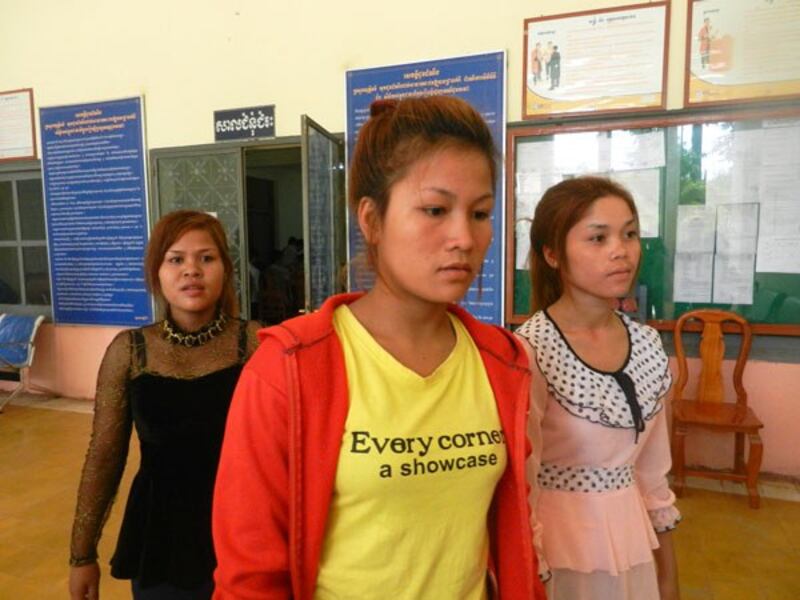A court in Cambodia on Tuesday convicted a former city governor of shooting and injuring three protesting women workers and ordered him jailed for 18 months, in a case that rights groups say reflects the country’s pervasive culture of impunity.
Lawyers for the three women said former Bavet governor Chhouk Bandith, who was charged with “unintentional violence,” should have been charged with murder. Rights groups called the sentence lenient and prosecutors are considering appealing the decision.
“The sentence is little more than a slap on the wrist, and is emblematic of Cambodia’s pervasive culture of impunity for the well-connected elite,”said rights groups Cambodian Community Legal Education Center (CLEC) and Cambodian League for the Promotion & Defense of Human Rights (LICADHO).
They said Chhouk Bandith, who was not present at the court proceedings in Svay Rieng province, should have received a harsher sentence “for actions that amounted [to] an attempted triple-homicide."
The shooting occurred when the three female workers were among thousands of workers protesting working conditions at the Kaoway Sports factory, a supplier for sportswear giant Puma, in February 2012.
The victims’ lawyer Sarei Bothchakriya said that the three victims were unsatisfied with Tuesday’s court ruling.
“Justice is not fully awarded yet because we had requested that the court sentence [Chhouk Bandith] with premeditated murder and provide a larger amount of compensation to the victims,” he said.
Svay Rieng Court Judge Leang Sour also ordered Chhouk Bandith, who was removed from his post as governor of Bavet city after the shooting, to pay 38 million riel (U.S. $9,500) in compensation to the victims, aged between 18 and 23 at the time of the incident.
An arrest warrant was issued in the name of the former governor, who has never been arrested for the shooting.
The court had earlier dropped the case against the ex-governor but the charges were reinstated by Cambodia’s Appeals Court in March.
Svay Rieng Court prosecutor Kea Suntharo called the verdict “acceptable,” but said he would consider appealing the decision to ask for a greater punishment.
One of the victims, Nuth Sakhorn, 24, who was shot in the back and the arm, said that while none of the three women had received any threats, they were concerned for their safety because Chhouk Bandith had not been taken into custody.
Chhouk Bandith’s lawyer said he would appeal the conviction and sentence, through the Supreme Court if necessary.
German sportswear firm Puma applauded the court decision.
In an emailed statement, Puma told Agence France-Presse that it was “pleased” to see a verdict reached “that serves justice for the three victims who were incidentally shot.”

Rights groups angered
Local rights groups CLEC and Licadho said there were different justice systems for well-connected individuals and activists in Cambodia.
They cited the case of popular local land activist Yorm Bopha who was sentenced to three years in prison for an alleged physical assault even though there was no evidence presented in court linking her to the attack.
“Bandith opened fire on a group of thousands of people, with plenty of witnesses, and effectively got six months in prison for each person he shot,” said Licadho director Naly Pilorge.
“You can’t even call this a double standard—it’s two entirely different justice systems: one that is wielded as a weapon against activism, and another that serves and protects well-connected individuals.”
Moeun Tola, head of CLEC’s labor program, said that verdicts like the one from Svay Rieng court are destroying the international reputation of Cambodia’s vital garment sector, which employs more than a half million people and earns some U.S. $4.6 billion a year producing goods for Western clothing firms.
“The message is: Scapegoats and activists get large sentences, even if they didn’t commit a crime, while well-connected individuals get a slap on the wrist—no matter what their crime,” he said in a statement.
The statement urged prosecutors to appeal the verdict against Chhouk Bandith to “apply just and adequate charges and penalties under the law,” adding that “under no circumstances should the Court of Appeal allow Bandith to remain free while his appeal is pending.”
It also called on authorities to prioritize Bandith’s immediate arrest to prevent him from fleeing and to ensure that restitution is paid to his victims.
Reported by So Chivi for RFA’s Khmer Service. Translated by Samean Yun. Written in English by Joshua Lipes.
